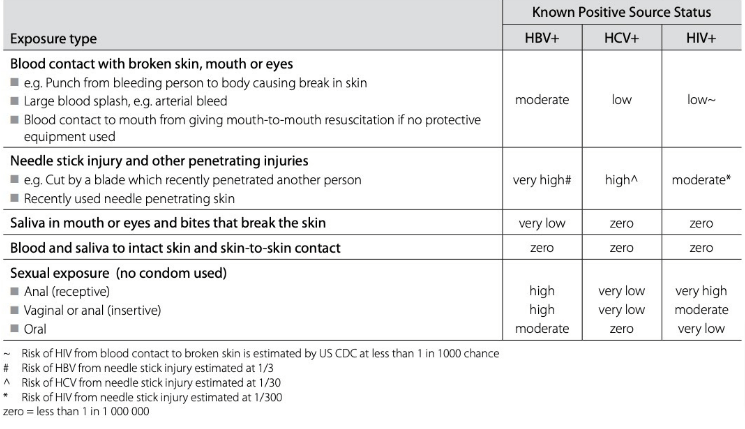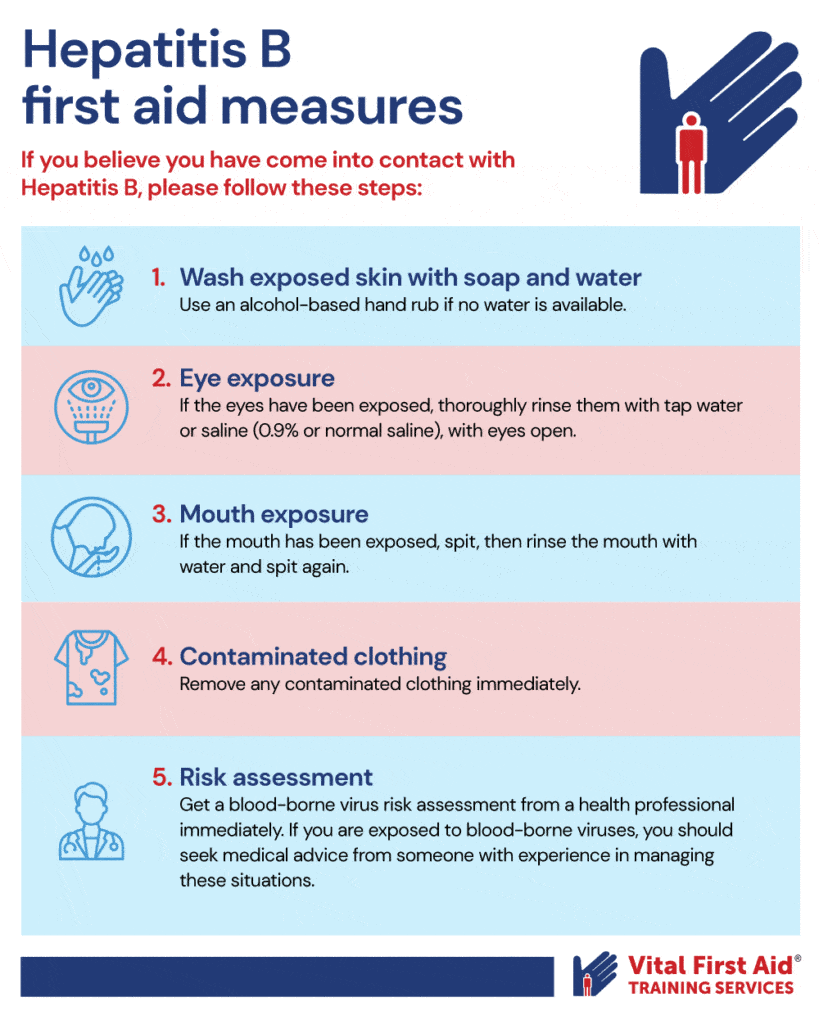Providing first aid to someone – especially someone you don’t know – comes with its own risks and challenges.
There is occasionally the risk of being exposed to “infectious diseases”, mainly Hepatitis B.
What Is Hepatitis B?
Hepatitis B is a disease spread by body fluids from infected people.
It affects the liver, with symptoms including abdominal pain and dark urine.
All ages are at risk of contracting this disease, but vaccinations can prevent it.
The treatment for Hepatitis B focuses on managing symptoms as there is no cure for the chronic form of the disease.
Hepatitis B First-Aid Measures
If you believe you have come into contact with Hepatitis B, please follow these steps:
- Wash exposed skin with soap and water. Use an alcohol-based hand rub if no water is available.
- If the eyes have been exposed, thoroughly rinse them with tap water or saline (0.9% or normal saline), with eyes open.
- If the mouth has been exposed, spit, then rinse the mouth with water and spit again.
- Remove any contaminated clothing immediately.
- Get a blood-borne virus risk assessment from a health professional immediately. If you are exposed to blood-borne viruses, you should seek medical advice from someone with experience in managing these situations.
Risk Of Transmission From A Known Positive Source

Preventing Hepatitis B
How To Avoid Hepatitis B Before Performing First Aid:
- Always wear protective equipment such as gloves, masks, etc.
- Look out for key hazards: vomit, blood, sharp objects and surfaces that could injure or impede first-aiders.
- Ensure the proper handling of sharp objects, spills, waste and laundry items.
Other Ways You Can Help Prevent Hepatitis B:
- DO NOT have unprotected sex with an infected person
- DON’T share needles or piercing equipment with an infected person
- NEVER share toothbrushes or razors with an infected person
- AVOID where possible a human bite from an infected person
- WATCH for needlestick injuries
- STAY CLEAR of exposure to open sores and bodily fluids of an infected person
Hepatitis B FAQs
Who Do You Have To Tell If You Have Hepatitis B?
With Hepatitis B, you can choose not to tell people. Infection control measures are required in some industries, such as piercing and tattoo shops, so these facilities shouldn’t have to make any changes.
Getting tested for hepatitis B will help your partner, family and friends. Hepatitis B can be prevented through vaccination if they do not already have it.
The law does require you to disclose your hepatitis B status in a few cases. These are: before donating blood at the blood bank, when applying for life insurance policies, when applying for the Australian Defence Force, including Navy, Army and Air Forces, if you’re a health care worker who performs exposure prone procedures, or when applying for a visa to live in Australia.
You will also be tested for hepatitis B if you wish to donate organs or sperm. Donating may still be possible, but this will be determined on a case-by-case basis.
How Is Hepatitis B Different To A, C, D and E?
Hepatitis A, B, C, D, and E are all caused by different viruses.
They all cause liver infections, but are not interchangeable.
- The Hepatitis A virus (HAV) is transmitted through exposure to contaminated food or drinking water or close direct contact with an infected person’s faeces. There is a vaccine available.
- A person infected with the hepatitis C virus (HCV) usually spreads it through direct contact with their blood. Injection drug equipment and needles are most often shared in this manner. There is a possibility of sexual transmission, but it is unlikely. Hepatitis C cannot be prevented by a vaccine.
- Hepatitis D virus (HDV) can only be contracted by people with chronic hepatitis B, either in combination with HBV or as a “superinfection”.
- Viral hepatitis E (HEV) is spread through the consumption of contaminated food or water, usually through direct contact with the faeces of infected people or animals. In developing countries, it is more prevalent.
The most common types of hepatitis in Australia are A, B, and C.
Can Hepatitis B be cured?
Sadly, there are no treatments that can cure chronic hepatitis B. But there are many treatments that can control the symptoms and a vaccine helps prevent it from developing.
How many people in Australia have Hepatitis B?
There are around 230,000 Australians living with chronic hepatitis B (CHB), but 2 out of every 5 are undiagnosed and of those diagnosed only a third are accessing regular tests.
Where To Get Help
- In an emergency, always call triple zero (000)
- Emergency department of your nearest hospital
- Your GP (doctor)
- Your local community health centre
- Your local government immunisation service
- National Immunisation Information Line Tel. 1800 671 811
At Vital First Aid, our nationally recognised and award-winning courses are available throughout Sydney, Newcastle and the Central Coast.




